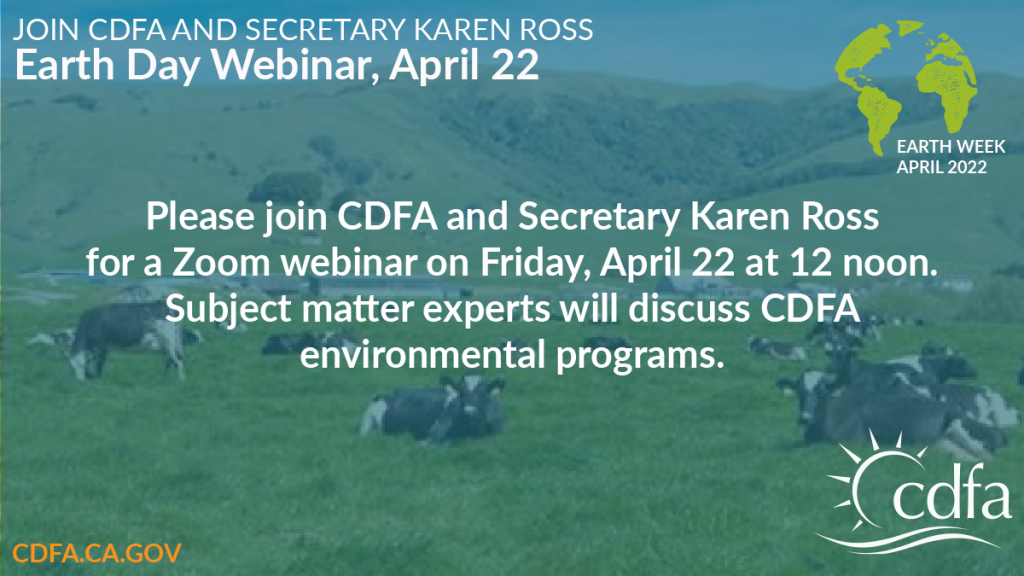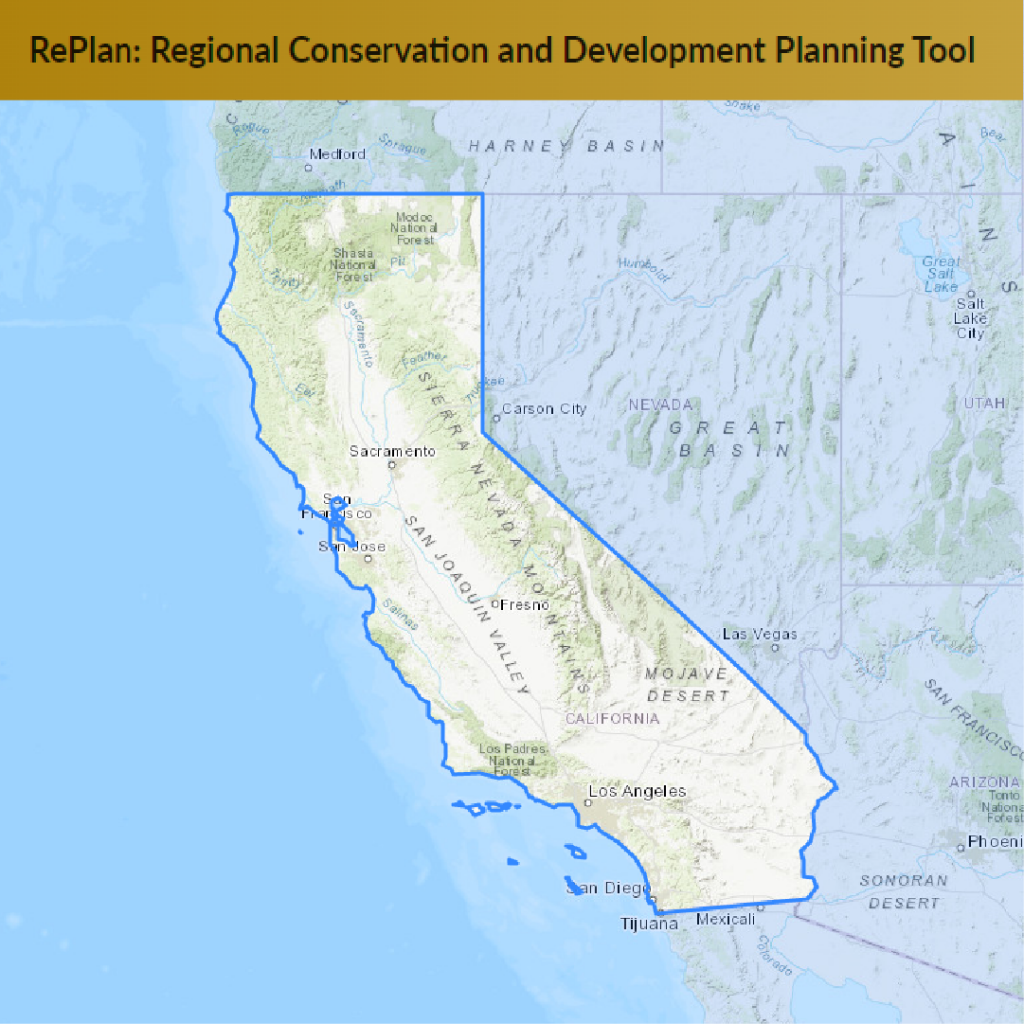-
Recent Posts
- Farm-to-School Month Grantee Spotlight: Santa Ana Unified
- Hispanic Heritage Month — Javier Zamora’s Journey from Farmworker to Farm Owner
- CDFA Celebrates National Farm to School Month!
- Celebrating Hispanic Heritage Month: CDFA Panel Discussion Reflects on Language, Identity and Community
- Secretary Ross at UN FAO Global Livestock Conference in Rome
Recent Comments
- Kathy de Contreras on CDFA IT department honored at “Best of California” awards
- El costo económico de las deportaciones masivas ya es visible en California - Espanol News on Nine California Counties Make Top-10 List for Ag Sales in the U.S.
- Deportations are taking a toll on California’s economy – and have only just begun – The News Beyond Detroit on Nine California Counties Make Top-10 List for Ag Sales in the U.S.
- Kenneth Cooper McNany on California Agricultural Heritage Club seeks nominations to honor pioneering farms and ranches more than 100 years old
- William Griffin on Lowering the boom on illegal fireworks — CDFA teamed up with San Bernardino County Fire to confiscate 13 tons prior to July 4th
Archives
- October 2025
- September 2025
- August 2025
- July 2025
- June 2025
- May 2025
- April 2025
- March 2025
- February 2025
- January 2025
- December 2024
- November 2024
- October 2024
- September 2024
- August 2024
- July 2024
- June 2024
- May 2024
- April 2024
- March 2024
- February 2024
- January 2024
- December 2023
- November 2023
- October 2023
- September 2023
- August 2023
- July 2023
- June 2023
- May 2023
- April 2023
- March 2023
- February 2023
- January 2023
- December 2022
- November 2022
- October 2022
- September 2022
- August 2022
- July 2022
- June 2022
- May 2022
- April 2022
- March 2022
- February 2022
- January 2022
- December 2021
- November 2021
- October 2021
- September 2021
- August 2021
- July 2021
- June 2021
- May 2021
- April 2021
- March 2021
- February 2021
- January 2021
- December 2020
- November 2020
- October 2020
- September 2020
- August 2020
- July 2020
- June 2020
- May 2020
- April 2020
- March 2020
- February 2020
- January 2020
- December 2019
- November 2019
- October 2019
- September 2019
- August 2019
- July 2019
- June 2019
- May 2019
- April 2019
- March 2019
- February 2019
- January 2019
- December 2018
- November 2018
- October 2018
- September 2018
- August 2018
- July 2018
- June 2018
- May 2018
- April 2018
- March 2018
- February 2018
- January 2018
- December 2017
- November 2017
- October 2017
- September 2017
- August 2017
- July 2017
- June 2017
- May 2017
- April 2017
- March 2017
- February 2017
- January 2017
- December 2016
- November 2016
- October 2016
- September 2016
- August 2016
- July 2016
- June 2016
- May 2016
- April 2016
- March 2016
- February 2016
- January 2016
- December 2015
- November 2015
- October 2015
- September 2015
- August 2015
- July 2015
- June 2015
- May 2015
- April 2015
- March 2015
- February 2015
- January 2015
- December 2014
- November 2014
- October 2014
- September 2014
- August 2014
- July 2014
- June 2014
- May 2014
- April 2014
- March 2014
- February 2014
- January 2014
- December 2013
- November 2013
- October 2013
- September 2013
- August 2013
- July 2013
- June 2013
- May 2013
- April 2013
- March 2013
- February 2013
- January 2013
- December 2012
- November 2012
- October 2012
- September 2012
- August 2012
- July 2012
- June 2012
- May 2012
- April 2012
- March 2012
- February 2012
- January 2012
- December 2011
- November 2011
- October 2011
- September 2011
- August 2011
- July 2011
- June 2011
Categories
- AG Vision
- Agricultural Education
- Agricultural Marketing
- Alternative Fuels
- Animal health
- Animal Welfare
- Asian Citrus Psyllid
- Biodiversity
- Border stations
- BSE
- Cannabis
- Cannella Panel
- Climate Change
- Climate Smart Agriculture
- Community-based Food System
- Conservation
- Dairy
- Drought
- Environment
- Fairs
- Farm Bill
- Farm Labor
- Farmers' Markets
- Fertilizer
- Food Access
- Food Safety
- Food Waste
- Glassy-winged Sharpshooter
- Growing California
- Healthy soils
- HLB
- Hydrogen
- Integrated Pest Management (IPM)
- Invasive Species
- Light Brown Apple Moth
- Livestock ID
- Measurement Standards
- Nutrition
- Organic agriculture
- Pierce's Disease
- Pollinators
- Specialty Crops
- State Board of Food and Agriculture
- Succession Planning
- Trade
- Uncategorized
Pages

#EarthDay2022 webinar today!
Please join Secretary Ross and CDFA science experts today at noon for an Earth Day webinar on agency environmental programs:
https://us06web.zoom.us/j/86165655320
Passcode: CDFA@2022
Posted in Uncategorized
2 Comments
Secretary Ross joins Land O’Lakes for 100th anniversary celebration
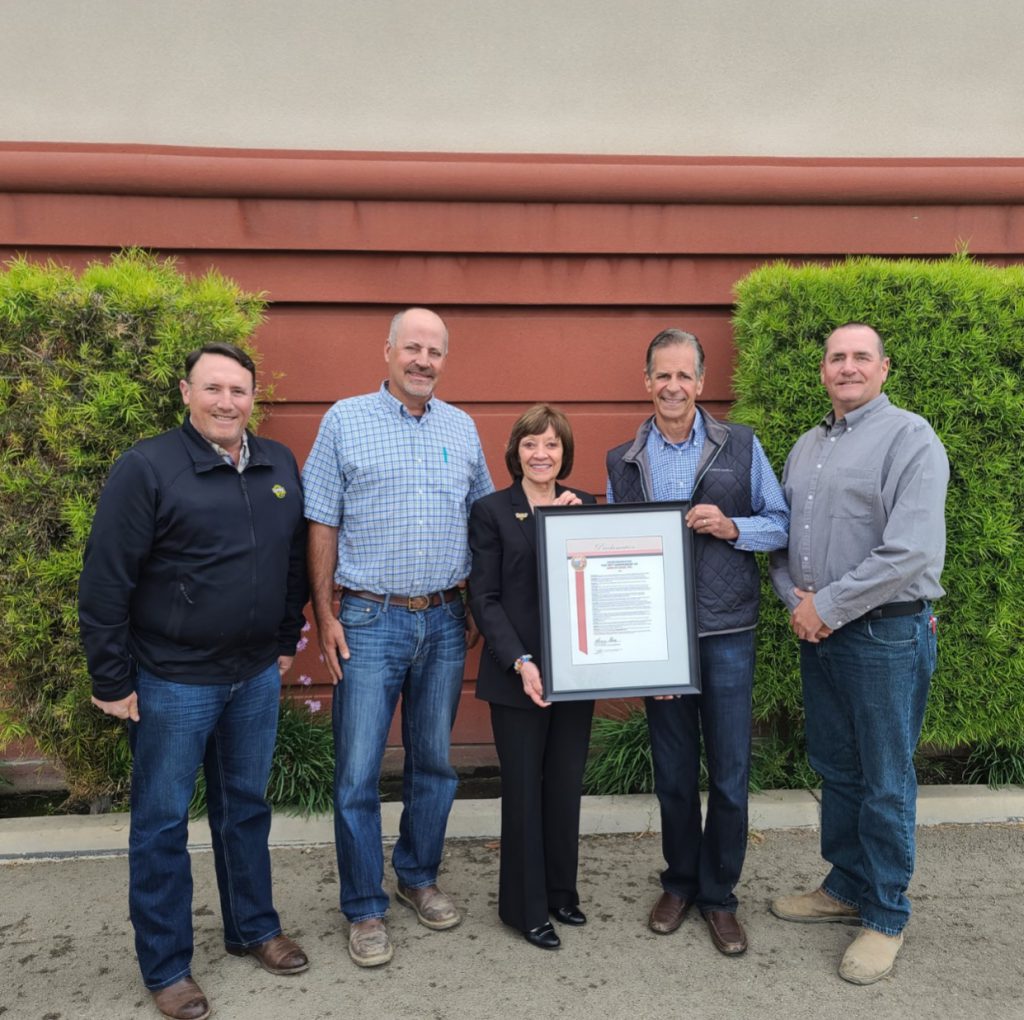
Posted in Uncategorized
1 Comment
#EarthWeek2022 — New Online Tool Streamlines Application Process for Climate Smart Ag Programs
A new tool designed to provide farmers and ranchers with key information about climate smart agriculture programs is now available online. The tool features a user-friendly map for users to explore, screen and efficiently identify regions for analysis, comparison and reporting. The intent is to place this information at the fingertips of farmers and ranchers, making the application process faster, and more efficient. The web-based tool, named RePlan (Regional Conservation and Development Planning Tool), comes as a result of a partnership between CDFA, the Strategic Growth Council, the Governor’s Office of Planning and Research, and the Conservation Biology Institute. RePlan developers have created applications for two CDFA programs — the Healthy Soils Program (HSP) and the Alternative Manure Management Program (AMMP).
For HSP, RePlan combines site location technology and environmental datasets in a user-friendly website to assist applicants in determining eligible individual soil management practices as well as the compatibility of multiple practices.
For AMMP, the tool combines relevant datasets with site location and analysis tools to identify practices that will reduce dairy and livestock methane emissions through the implementation of non-digester approaches. In one step, a farmer can model current and proposed practices, explore alternative practices, calculate the resulting emission reductions using California Air Resources Board tools, and submit a final proposal package for AMMP funding.
The Partners
The California Strategic Growth Council (SGC) collaborates with public agencies, communities, and stakeholders to achieve sustainability, equity, economic prosperity, and quality of life for all. SGC also manages several grant programs funded by the California Climate Investments (CCI) that aim to reduce greenhouse gas emissions while providing also providing a variety of other benefits – particularly in disadvantaged communities.
The Governor’s Office of Planning and Research (OPR) studies future research and planning needs, fosters goal-driven collaboration, and provides guidance to state partners and local communities, with a focus on land use and community development, climate risk and resilience, and high-road economic development.
The Conservation Biology Institute (CBI) applies the best science and technology available to accelerate the conservation, recovery, and adaptation of biological diversity in a fast-changing world. Their expertise includes GIS and decision-support tools, global forest conservation, landscape modeling, water, energy, and infrastructure development. CBI created Data Basin in response to the increased demand for geographic environmental and conservation data access, integration, interpretation, analysis, and sharing.
Posted in Uncategorized
Leave a comment
#EarthWeek2022 — CDFA’s commitment to climate change adaptation and environmental stewardship
Welcome to Earth Week! With the annual Earth Day recognition coming on April 22, CDFA is taking this opportunity to discuss its environmental stewardship work throughout the week.
Because agriculture is dependent on a healthy and stable environment, environmental quality and protection are integral to CDFA’s activities. Examples include Integrated Pest Management approaches in the Division of Plant Health and Pest Prevention Services, facilitating the expansion of zero emission vehicles at the Division of Measurement Standards, and lessening the impact of nitrogen in soils and groundwater through the work of the Fertilizer Research and Education Program (FREP).
CDFA’s Office of Environmental Farming & Innovation oversees and administers climate-focused programs like the State Water Efficiency and Enhancement Program (SWEEP), the Healthy Soils Program, the Alternative Manure Management Program, and more. The objective of these programs is to incentivize practices that result in a net benefit for agriculture and the environment through innovation, efficient management, and science.
CDFA will share more information about its environmental programs on Earth Day with a webinar via Zoom that will be available for public participation, from 12 noon to 1:30 pm. We hope you will join us! The pertinent information is below:
https://us06web.zoom.us/j/86165655320
Passcode: CDFA@2022
Or One tap mobile :
US: +16699006833,,86165655320#,,,,*875550502# or +12532158782,,86165655320#,,,,*875550502#
Or Telephone:
Dial(for higher quality, dial a number based on your current location):
US: +1 669 900 6833 or +1 253 215 8782 or +1 346 248 7799 or +1 312 626 6799 or +1 929 205 6099 or +1 301 715 8592
Webinar ID: 861 6565 5320
Passcode: 875550502
International numbers available: https://us06web.zoom.us/u/ko4JC6s5n
Posted in Uncategorized
Leave a comment
Southern California high school adds beekeeping to curriculum — from the Orange County Register
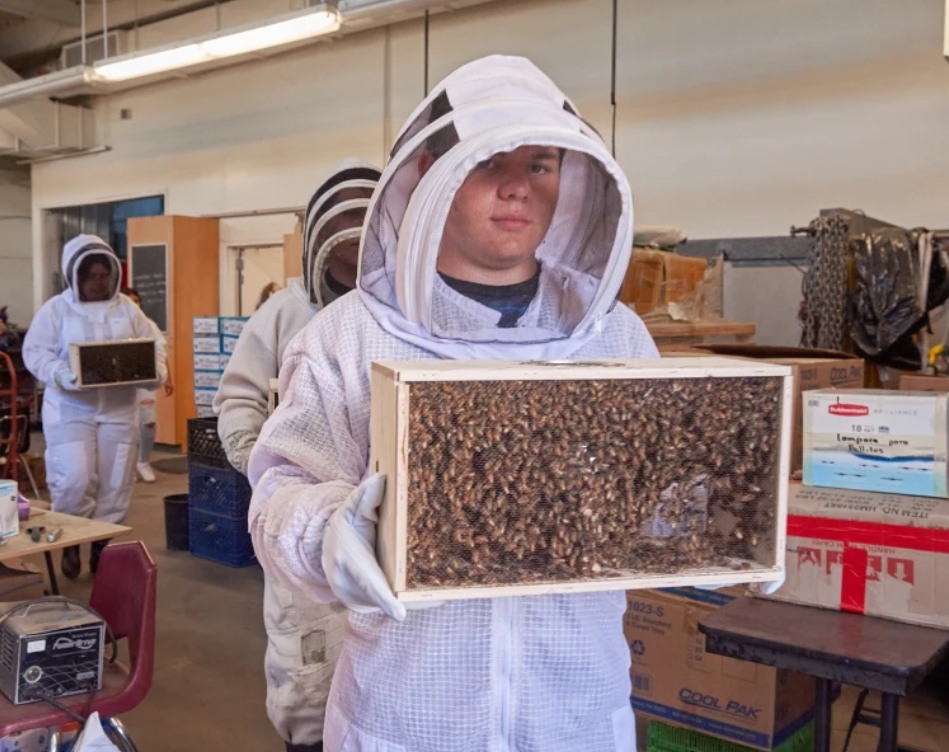
By Grace Toohey
Mayra Bahena had always been told to try to stay away from bees.
But then the Westminster High junior found herself head-to-toe in a white beekeeping suit, accepting thousands of bees on behalf of her high school’s new agriculture program addition.
“To willingly hold bees and be around them is so ironic and funny,” Bahena said. “I’ve never ever held that many bees in my life – it was something so new and exciting.”
Bahena is one of about 15 students helping establish California’s first high school beekeeping program, hoping to create a sanctuary at Westminster High for six queen bees and 60,000 worker bees to live, work and eventually produce honey, beeswax and other hive by-products.
“I was all in, it’s something so different,” said Bahena, who is a leader in the school’s FFA program, a student organization focused on leadership and career opportunities through agriculture education. “I know this is going to bring a lot of color and uniqueness to our school.”
Through a partnership with the Community Action Partnership of Orange County and with startup funds from the USDA, Westminster High accepted the bees from local company Honey Pacifica, beginning the months-long process of caring for the bees, harvesting their honey and making marketable products.
While the high school already has an expansive agricultural program – including its 8-acre Giving Farm on which students grow donations for local food pantries, as well as projects to raise livestock and operate farming machinery – the beekeeping program will further enhance students’ educational opportunities and hands-on experiences, agriculture instructor Dave Eusantos said.
“These are city kids, and some of them they see bees, but they don’t give them a second thought and what that creature means to their food supply,” Eusantos said. “Learning about bees is so very fascinating, it’s a fantastic way to teach so many areas of agriculture science.”
Eusantos said he’s leaning heavily on the support and wisdom of Honey Pacifica owner Jon Poto to help jump-start the program. The program already has plans to grow a pollinator garden for the bees, and is working with other programs for studying marketing and culinary arts to help advertise and sell the students’ soon-to-be honey products.
Eusantos and Poto said they expect the school’s first batch of honey could be harvested by August or September.
Poto said his company’s involvement in the workforce development program at the high school is special because Honey Pacifica’s origins can be traced to his brother Frank’s high-school science project involving bees.
“This was the catalyst for our family’s journey into beekeeping,” he said. “We’re so excited to work with Westminster High School’s passionate students to bring this working bee colony to life, which we’re hoping will lead to a profitable honey endeavor.”
Community Action Partnership officials said they hope the program at Westminster High can become a model for other schools in the region, especially as projections show that income from the bee products should offset most costs to run the program, with volunteers and students providing the necessary workforce.
“These students have worked diligently to provide this colony of bees a safe home here at our Giving Farm and we’re confident they will take great care of them and produce quality, organic honey that locals will love,” Westminster High Principal Amy Sabol said.
While Eusantos said he understands not all the students in his agriculture classes or the FFA program are interested in pursuing careers in agriculture – Bahena hopes to study liberal arts in college – he knows the coursework and experiences are still so valuable. He said he’s focused on helping the teens better understand how they interact with food and materials, so they can be “responsible citizens.”
“I’m not trying to turn them into a farmer,” he said. “I’m trying to teach you about where your food and fiber comes from.
“I know the looks on the students’ faces and their body language as they were putting the bees into the beehives – it was a once in a lifetime experience,” he said. “That’s something that you can’t mimic in terms of a zoom meeting, … or YouTube video. Seeing it, hearing it, smelling it and feeling it, this hands-on, in-person experience is so valuable.”
Posted in Uncategorized
Leave a comment
In advance of Mental Health Awareness Month, CDFA launches website with mental health resources for farmers, ranchers and farmworkers
The events of the last two years have shined a light on the pressures faced by California farmers, ranchers and farmworkers, and created a greater appreciation for their accomplishments. Many of these pressures are impacted by factors out of their control: climate change, drought, markets, weather, evolving policies and regulations, global supply chain issues, and geopolitcal events. Some of these seem unrelated individually, but they all have a very real impact on everyday decisions and efforts to maintain and expand viable businesses and family legacies.
CDFA is committed to facilitating equitable mental health support and resources for farmers, farmworkers, and organizations that work directly with the agricultural community. In advance of Mental Health Awareness Month (May), we are introducing a new webpage to promote the Western Regional Agriculture Stress Assistance Program (WRASAP) and California’s CalHOPE network. The webpage and related outreach materials are available in English and Spanish. This project was made possible by a $500,000 grant from USDA National Institute of Food and Agriculture.
“We feel for the farming community and want to do all we can to help,” said CDFA secretary Karen Ross. “With all that is occurring in our world affecting agriculture and everyone involved in, it we are pleased to have a grant to expand partnerships and mental health support in our rural communities.”
CDFA and its partners will disseminate information and resources within agricultural communities to assist farmers and farmworkers needing mental health assistance. Additionally, partner organizations Cal AgrAbility (UC Davis) and CSU Fresno will host Question, Persuade, Respond (QPR) workshops, intended to teach individuals how to recognize the warning signs of suicide, as well as provide training for organizations assisting farmers and farmworkers in the Central Valley.
CalHOPE will disseminate brochures, radio spots, and digital ads in English and Spanish to ensure more farmers and farmworkers are aware of the existing mental health resources and can access help when they need it. An additional partner on this project, the California Health and Human Services Agency, operates the CalHOPE program, which delivers crisis support for communities.
There is a virtual public stakeholder meeting scheduled for May 6, 2022 to discuss challenges and opportunities for addressing farmer and farmworker health. Visit GrowMentalWellness.org for more information.
In Spanish:
En anticipación del Mes de Concientización sobre la Salud Mental, CDFA lanza un sitio de internet con recursos de salud mental para agricultores, ganaderos y trabajadores agrícolas
Los eventos de los últimos dos años han mostrado las presiones que enfrentan los agricultores, ganaderos y trabajadores agrícolas de California, y un mayor aprecio por sus logros. Muchas de estas presiones se ven afectadas por factores fuera de su control: cambio climático, sequía, mercados, clima, políticas y regulaciones en desarrollo, problemas de la cadena de suministro global y eventos geopolíticos. Algunos de estos parecen no estar relacionados individualmente, pero todos tienen un impacto muy real en las decisiones cotidianas y el impulso para mantener y expandir negocios viables y legados familiares.
CDFA se compromete a facilitar el apoyo y los recursos equitativos de salud mental para agricultores, trabajadores agrícolas y organizaciones que trabajan directamente con la comunidad agrícola. En anticipación del Mes de Concientización sobre la Salud Mental (mayo), estamos presentando una nueva página de internet para promover el Programa Regional de Asistencia para el Estrés Agrícola del Oeste (WRASAP, por sus siglas en inglés) y la red CalHOPE de California. La página web y los materiales de divulgación relacionados están disponibles en inglés y español. Este proyecto fue posible gracias a fondos económicos de $500,000 por parte del Instituto Nacional de Alimentos y Agricultura del USDA.
“Sentimos por la comunidad agrícola y queremos hacer todo lo posible para ayudar”, dijo la secretaria de CDFA, Karen Ross. “Con todo lo que está ocurriendo en nuestro mundo que afecta a la agricultura y a todos los que son parte, nos complace tener fondos para expandir las asociaciones y el apoyo a la salud mental en nuestras comunidades rurales.”
CDFA y sus socios compartirán información y recursos dentro de las comunidades agrícolas para ayudar a los agricultores y trabajadores agrícolas que necesitan asistencia para el estrés. Además, las organizaciones asociadas Cal AgrAbility (UC Davis) y CSU Fresno organizarán talleres de “Preguntar, Persuadir, Referir (QPR)”, que tiene como propósito a enseñar a las personas cómo reconocer las señales de alerta del suicidio, así como proporcionar capacitación para las organizaciones que ayudan a los agricultores y los trabajadores agrícolas en el Valle Central.
CalHOPE difundirá folletos, anuncios de radio y anuncios digitales en inglés y español para asegurar que más agricultores y trabajadores agrícolas conozcan los recursos disponibles y puedan obtener ayuda cuando la necesiten. Un socio adicional incluye la Agencia de Salud y Servicios Humanos de California, que maneja el programa CalHOPE y brinda apoyo en situaciones de crisis a las comunidades.
Habrá una reunión pública de partes interesadas, programada para el 6 de mayo del 2022 para discutir los retos y oportunidades para abordar la salud mental de los agricultores y trabajadores agrícolas. Visite GrowMentalWellness.org para obtener más información.
Posted in Uncategorized
Leave a comment
UC Davis ranks among best in world for veterinary science and agriculture
From the UC Davis web site
By Julia Ann Easley
Once again, University of California, Davis, leadership in the fields of veterinary science, and agriculture and forestry has been recognized — this time in the 2022 QS World University Rankings by Subject, released on April 6.
Quacquarelli Symonds, considered one of the most influential international university rankings providers, ranked UC Davis first in the nation and second in the world in both subjects.
Since veterinary science was added to the rankings in 2015, UC Davis has been first in the world five times and is No. 2 for a third time. The campus was No. 1 in agriculture and forestry in the first three years the subject was ranked and has held the No. 2 spot since 2016.
UC Davis was ranked 43rd in the world and tied for 18th in the nation in the broad category of the life sciences and medicine. Demonstrating its strength across the disciplines, the campus was also ranked globally and nationally in each of the other broad categories: natural sciences, engineering and technology, arts and humanities, and social sciences and management.
In addition to being top-ranked in veterinary science and agriculture and forestry, the university had top 50 world rankings in six other subjects and top 20 national rankings in eight.
“I’m proud that UC Davis continues to be recognized for the world-class education it provides as well as for the impact of its research and service,” said Chancellor Gary S. May.
Read more here: https://www.ucdavis.edu/news/uc-davis-ranked-among-best-world-nation-veterinary-science-ag-0
Posted in Uncategorized
1 Comment
Helping California build the “Hydrogen Village”
CDFA’s Division of Measurement Standards

Today on the steps of the State Capitol, The California Department of Food and Agriculture’s Division of Measurement Standards (DMS) is taking part in a “Hydrogen Village” showcasing hydrogen and fuel cell technologies. DMS plays a key part in the rollout of hydrogen-fueled vehicle technology. DMS scientists provide the technical expertise and equipment to verify the quality and purity of hydrogen fuel sold in California, and they also verify the accuracy of hydrogen fuel dispensers so that California consumers get exactly what they pay for.
“Hydrogen Village at the Capitol” is a joint project of the California Fuel Cell Partnership and the California Hydrogen Coalition. The event is an opportunity for stakeholders to showcase the value and performance of hydrogen and fuel cell technologies and tell the larger story of how these advances help California achieve its climate, equity and economic goals.







CDFA welcomes Arturo Barajas to the Sacramento County Fair Board
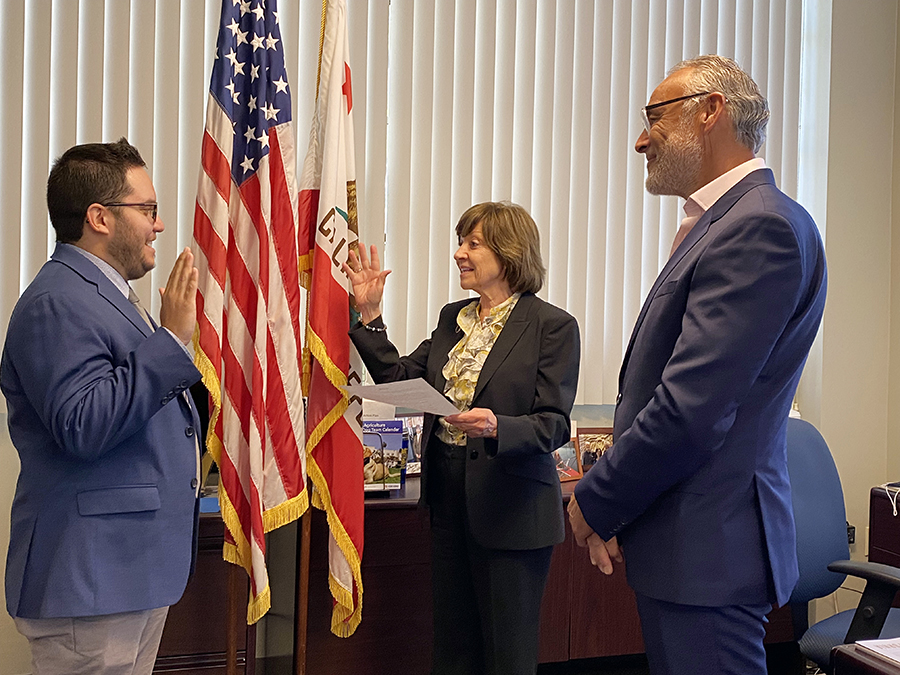
Posted in Uncategorized
Leave a comment


